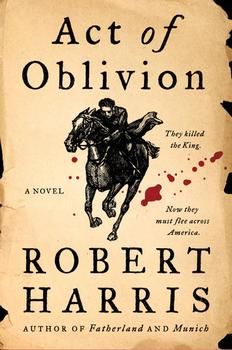Summary | Excerpt | Reviews | Beyond the Book | Readalikes | Genres & Themes | Author Bio

A Novel
by Robert Harris
Nathaniel said, 'Did you know the Lord Protect Her, Ned?'
'I did, very well.'
'He's dead, you know.'
'Hush,' said Mrs Gookin.
'Yes, Nathaniel, that he is,' replied Ned sadly. 'More's the pity.'
There was a silence.
Mr Gookin clapped his hands. 'Boys, fetch the colonels' bags for them.'
Until that moment, Mary Gookin had nursed a hope that her husband had merely offered the men a ride. Now, as she watched them unload their luggage from the cart and hand it to her sons, she felt dismay. It was hardly the homecoming she had dreamed of – to feed and shelter two senior officers of the English army.
'And where are we to put them, Daniel?' She spoke quietly, so they could not hear, and took care not to look at him, the easier to keep her temper.
'The boys can give up their beds and sleep downstairs.'
'How long are they to stay?'
'As long as it is necessary.'
'What is that? A day? A month? A year?'
'I cannot say.'
'Why here? Are there no rooms to be had in Boston? Are colonels too poor to pay for their own beds?'
'The governor believes Cambridge a safer lodging place than Boston.'
Safer ...
'You've consulted the governor about their accommodation?'
'We've been with him half the day. He gave us dinner.'
So that was why his journey from Boston had taken him so long. She watched the boys struggling under the weight of the large bags, the two colonels walking behind them towards the house, talking to the girls. To her feelings of dismay and irritation was suddenly added an altogether sharper emotion. Fear.
'And why,' she began hesitantly, 'why does the governor believe Cambridge is safer than Boston?'
'Because Boston is full of rogues and royalists, whereas here they will be among the godly.'
'They're not visitors from England, then, so much as ... fugitives?' He made no answer. 'From what is it they run?'
Gookin took a while to reply. By the time he spoke, the men had gone inside. He said quietly, 'They killed the King.'
Chapter Two
IN ENGLAND, IT was almost nine in the evening, the sun just setting. Isabelle Hacker, her plain blue Quaker dress coated brown with dust after two days on the road, was riding into her home village of Stathern, Leicestershire.
Close behind her rode another figure. His constant proximity unnerved her. So did his silence. He had followed her all the way north from London. Even when they broke their journey for the night, he had barely directed a word at her. In his pocket she knew he carried a commission from the House of Lords issued three days earlier. He had shown it when he came to her door in London: Hereupon it is Ordered, That Colonel Hacker do forthwith send his Wife into the Country, to fetch the said Warrant; and that the Gentleman Usher attending this House do send a Man along with her for that Purpose.
He said, 'I am that man.'
Mrs Hacker had agreed at once to accompany him to the country. She was ready to do anything to help her husband, at that moment held in the Tower on suspicion of treason, for which the punishment was a death of an almost unimaginable and protracted horror: to be hanged until the point of unconsciousness, cut down, revived, castrated, disembowelled – the entrails dragged out and burned in front of the living victim – then beheaded and his body cut into four quarters for public display. Unimaginable, yet she could not stop tormenting herself by picturing it. Almost the worst part was that he would leave this world in a welter of agony and at the end she would not even have a body to lay to rest.
She had said goodbye to her children and within the hour they had been on the road. By surreptitious observation, she guessed the man to be roughly forty – a few years younger than herself – and that he had suffered some wound or defect at birth that caused him to walk with a barely perceptible limp. His torso was broad, his legs short, his voice when he chose to use it oddly soft. He had told her his name was Richard Nayler. She gathered he was some kind of clerk to the Privy Council. He rode well. More than that she could not say.
Excerpted from Act of Oblivion by Robert Harris. Copyright © 2022 by Robert Harris. Excerpted by permission of Harper. All rights reserved. No part of this excerpt may be reproduced or reprinted without permission in writing from the publisher.
No pleasure is worth giving up for the sake of two more years in a geriatric home.
Click Here to find out who said this, as well as discovering other famous literary quotes!
Your guide toexceptional books
BookBrowse seeks out and recommends the best in contemporary fiction and nonfiction—books that not only engage and entertain but also deepen our understanding of ourselves and the world around us.